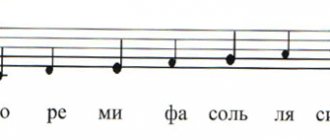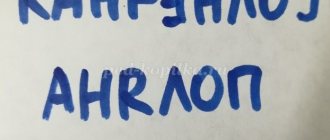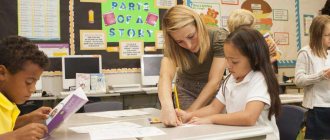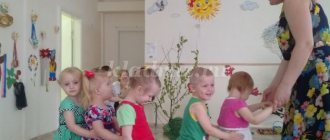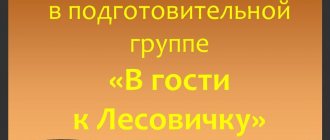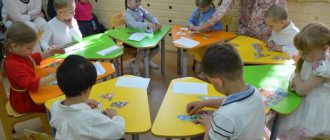Quest game “In search of the lost word”
author: Zvereva Larisa Aleksandrovna
teacher-speech therapist MBDOU DS No. 10 Technological map of GCD for preparation for teaching literacy in the preparatory group
Quest game “In search of the lost word”
Municipal budgetary preschool educational institution
kindergarten No. 10 “Rodnichok”
Technological map of GCD for preparation for training
literacy in the preparatory group
Quest game “In search of the lost word”
Prepared by: speech therapist teacher
Zvereva Larisa Alexandrovna
Ozersk, 2019
GCD type: Final lesson-game with elements of quest technology.
Form of organization: group.
Age group: preparatory. Educational areas: speech development, social and communicative development, cognitive development.
GOAL: consolidation of skills acquired in the process of educational development of speech and preparation for learning to read and write.
Tasks:
Educational:
Improve skills:
- select antonyms,
- make up words and sentences,
- find related words and select adjectives for them,
- recognize sounds in a word.
Developmental:
-develop communication skills;
-logical thinking, attention, intelligence;
-promote the development of fine motor skills of the hands as an effective means of overcoming speech disorders;
Educational:
- cultivate interest in working with words and sounds;
-the ability to listen to each other, tactfully complement the answers of comrades if necessary;
- skills of self-control, self-esteem and mutual assessment.
— improve the ability to work in a team, the desire to help each other; Additional tasks:
Game task
: consolidate the ability to play d/games using quest technology.
Planned results:
- children have an idea of the concepts of “sound” and “letter”;
- skillfully apply their knowledge;
- are able to actively interact with peers and adults, perform individual and collective tasks;
— have the skills to participate in gaming activities using quest technology.
Methodical techniques:
Verbal: conversation about vowels and consonants, questions, explanations.
Visual: pictures with tasks, diagrams
Gaming: didactic games
Practical: exercises in printed cards Materials and equipment: Necessary material: envelope with the task (sheet according to the color of the rainbow), objects arranged in a group corresponding to the description, ball, letter “A” (on a sheet), a set of letters for each child, corresponding pictures words.
GCD move:
Technological map of GCD
| № | GCD stages | Methods and techniques | GCD move | ||
| Activities of a teacher | Children's activities | Planned results | |||
| 1. Introductory part Motivational stage | Organizing time | -Guys, today I want to offer you a quest? what does this mean, do you know? What is a quest?) quest translated from English means search, and a quest game is an adventure game. In this game there are always tasks that must be completed in order to find or receive a message, and maybe a treasure. Well, shall we take the quest? | children's answers | Create a positive emotional mood | |
| Surprise moment | - Guys, what kind of envelope do you think this is? There is a letter and a map in it. what does it mean? the letter says: White field, Black seed, He who sows it, He understands, He who knows it, He will unravel. And this is your waybill. | children's answers | Build motivation in children to work Arouse interest in the activity with the help of a game situation and a surprise moment | ||
| GCD goal setting | And so, in front of you is an encrypted word, in order to decipher it you need to complete 7 tasks. Having completed the task, you receive a letter (the teacher shows a sheet painted with all the colors of the rainbow). Who will be responsible for storing the letters? | Children choose a team captain who will be responsible for the letter cards | The goal of the lesson was set by the children. | ||
| 2. Main part Content stage | Task No. 1 | The first color is red. The children are given the task of finding a red object in the group, made of fabric, with colored polka dots (curtain). Under this object there is a note with the task. Game "On the contrary" After answering, children receive the first letter “G” | children's answers | Ability to name words with antonyms. Children are able to name words that have opposite meanings and consolidate knowledge about their surroundings. | |
| Task No. 2 | Second color – orange The children are given the task to find in the group an orange object, small in size, round in shape, made of plastic (orange), under this object there is a note with the task. Game "Make a word" children use cards with letters to form this word (book) on the tables For children who have difficulty or do not know the letter, the teacher shows the spelling of this word. Having coped, the children receive the next letter “R” | Children, using cards with letters, make up this word on the tables, help each other, and analyze the word that came out. | The prerequisites for learning to read and write have been created An optical image of a letter and the ability to find it among other letters have been formed. Developed skills of mutual assistance and self-control | ||
| Task No. 3 | The third color is yellow The children are given the task to find in the group a yellow, large object, a headdress, needed by people in dangerous professions (helmet). Under this item is a note with a task. Game "Related Words" Having coped, the children receive the next letter “A” | Children form new words from a given word | The ability to form new words from a given word has been developed. | ||
| Task No. 4 | The fourth color is green The children are given the task of finding a green, large object made of glass (vase) in the group. Below this item is a task. Game “Make a sentence from words.” Having coped, the children receive the next letter “M” | Team 1: children make a sentence out of words Team 2: children who cannot read lay out a sentence from pictures and diagrams. | The ability to switch from one type of activity to another has been developed. Spatial orientation and the ability to construct words into sentences have been developed | ||
| Task No. 5 | The fifth color is blue. The children are given the task of finding a medium-sized object in the group, made of rubber, with blue fabric on top. Below this item is a task. Game “Names with sound A” (children need to line up in one column whose name contains the sound A. If the child’s name does not have this sound, you need to call him affectionately. For example: Ilya - Ilyushenka). Then all the children will line up in one column. Having coped, the children receive the next letter “A” | Children pronounce each other’s names out loud and determine the presence of the sound “A” | The ability to work in groups has been developed. The ability to identify repeating sounds in all words has been developed. | ||
| Task No. 6 | Sixth color - blue The children are given the task to find in the group a round-shaped object, small in size, made of polystyrene foam in a blue suit with gold snowflakes, under this object there is a task. Game "My, mine, mine" Children are shown pictures and they choose a pronoun. Once completed, children receive the next letter “T” | Children arrange cards according to tables with pronouns | The ability to coordinate a noun with a pronoun in gender and number has been developed | ||
| Task No. 7 | The seventh color is purple Children are given the task of finding a purple, large, hemispherical object with massage fingers. Below this item is a task. Game "Catch the syllable". The teacher names a syllable, and the children must come up with a word starting with this syllable (for example: vo-voda, se-secret, zi-zima, etc.). Having coped, the children receive the next letter “O” | Children name words starting with a given syllable | The ability to divide words into syllables has been developed | ||
| 3. Final part 1) Reflective 2) Motivation for subsequent work | After all the tasks, the teacher lays out the word LITERATURE on the board and asks about the meaning of this word. — Guardian of letters, show us the cards. Let's try to collect the word that was in the riddle? Teacher: Literacy is the ability to write and read. All our tasks today will help you become literate students at school in the future. There is a saying: Learning to read and write is always useful. reflection | children's answers | The ability to give complete, accurate answers to the teacher’s questions has been developed. Generated interest in further work | ||
Master class “Speech therapy games for children. Playing with Mom" for Mother's Day
Varvara Popova
Master class “Speech therapy games for children. Playing with Mom" for Mother's Day
Goal: pedagogical education of parents on the use of speech therapy games for the development of lexical and grammatical aspects of children’s speech.
Tasks:
• introduce parents to speech therapy games for the development of lexical and grammatical aspects of speech;
• teach master class participants methods and techniques for using educational games at home;
• implement a unified approach to the education and development of children in the family and in kindergarten;
• contribute to strengthening intra-family relationships;
• create a desire for cooperation and mutual understanding.
Materials: ball, memo with descriptions of games.
Preliminary work: drawing a portrait of mom, writing riddles-descriptions about mom according to the proposed plan
Progress of the master class
I. Welcome speech
Hello guys! Hello, dear mothers! Let me congratulate you on Mother's Day! I wish you smiles and warmth, love and understanding with your children!
At today's master class, I will show you several games to develop the lexical and grammatical aspects of children's speech. These games are universal in that they can be played at any time and anywhere: at home, in transport, on the way to kindergarten, on a walk, in line.
Regular use of these games will expand your child's vocabulary, make his speech more literate and simply allow you to spend time with your child in an interesting and useful way.
Well, shall we play?
II. Practical activities
The teacher invites the children, together with their mothers, to stand in two circles: the outer circle is the mothers, the inner circle is the children, and he himself stands in the center of the circle.
1. “Cooking together” (“From what – which”)
Goal: formation and development of the skill of forming relative adjectives from nouns.
The teacher takes turns throwing the ball and calling out the word. The child who catches the ball forms a relative adjective and returns the ball.
Guys, if you make juice from apples, it will be apple juice. What kind of juice will be from:
• oranges?
• peaches?
• grapes?
And the salad from:
• vegetables?
• cucumbers?
The teacher invites the children to turn to their mothers and continue the game: the mother names the word, the child – a relative adjective.
2. "Treats"
Goal: activation of the dictionary.
Let's remember the “delicious” words and treat each other.
The child names a “delicious” word and “puts it” on the mother’s palm (claps the palm, then the mother gives it to the child, and so on until the words run out.
This way you can play sweet, sour, salty, bitter, healthy words.
3. “One is many”
Goal: formation and development of the skill of forming the plural of nouns.
The teacher names a singular noun and throws the ball. The child who catches the ball forms the plural and returns the ball (table - tables, pan - pots, etc.)
Then the teacher invites the children to turn to their mothers and continue the game: the mother names the object in the singular, the child in the plural.
4. “Call me kindly”
Goal: formation and development of the skill of forming nouns with diminutive suffixes.
Now you and I will turn into wizards and reduce words.
The teacher names a noun and throws the ball. The child who catches the ball calls the word affectionately (forms a diminutive form) and returns the ball.
Then the teacher invites the children to turn to their mothers and continue the game.
5. “Magic glasses”
Goal: formation and development of the skill of agreeing a noun with an adjective.
Let's imagine that we have magic glasses. When we put them on, everything around us becomes colored, for example, red. Look around and tell what color all the objects are: red table, red doll, red cubes, red chairs, etc.
Now turn to your mothers and play this game together: mom will name the color, and you will name all the objects that have become that color.
6. “Count to five”
Goal: formation and development of the skill of agreeing numerals with nouns in gender and number.
Now we will count objects and name them. Let's count to five. For example, one ball, two balls, three balls, four balls, five balls.
The teacher names the noun, agreeing it with the numeral (“one ball”) and passes the ball around. Children take turns completing the task, counting to five. Then the teacher names a new object, which “we will count.”
Then the teacher invites the children to turn to their mothers and continue the game.
7. Riddles about mothers
Dear mothers! The children and I have prepared a surprise for you. This week the guys drew your portraits and made up riddles - each about their mother. Making riddles is also an excellent means for developing coherent speech and activating the vocabulary, because a riddle is a descriptive story, by composing which the child practices selecting words that denote the sign, action, features of what he is describing.
So, moms, try to get to know yourself...
The teacher shows portraits of mothers and reads out a riddle made by the child, and mothers guess who the riddle is about.
III. Summing up the master class
This concludes our master class. I want to thank you guys, and, of course, you, dear mothers, for participating in today's event. It was very pleasant and interesting for me to play with you and teach you something new.
Guys, did you enjoy participating in the master class for mothers? What do you remember most? (Children's answers)
Did you, moms, like playing speech therapy games? Which games were easy to play and which were challenging? Do you have questions about conducting speech therapy games?
(Parents' answers, discussion)
At the end of the master class, the teacher distributes a memo to parents describing speech therapy games.
